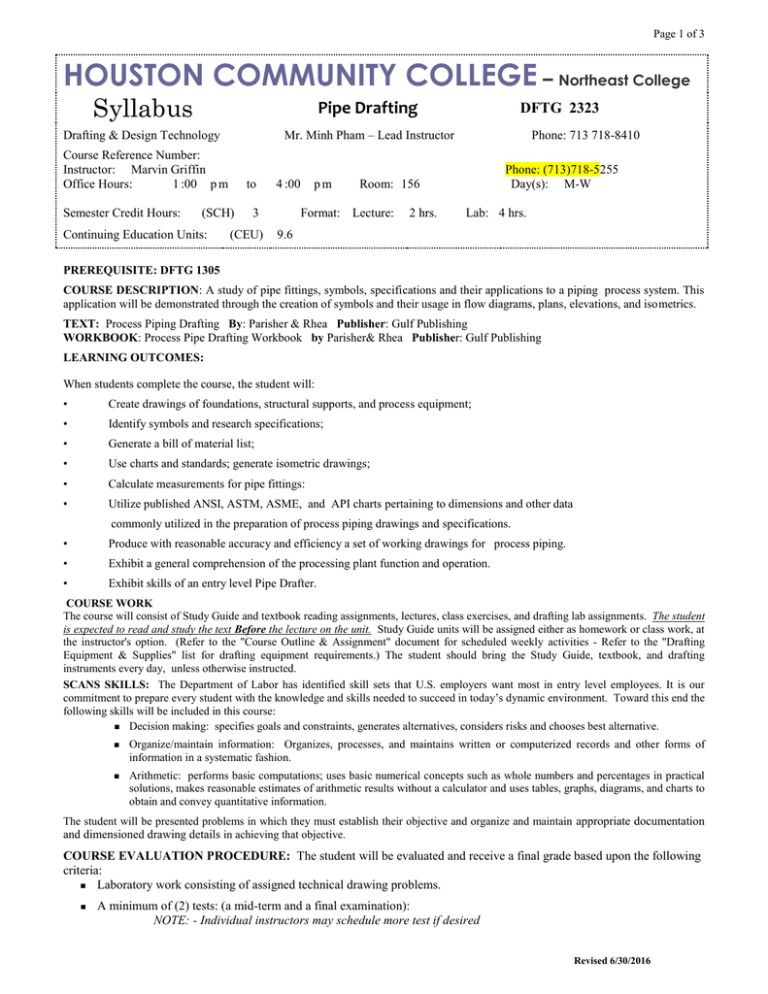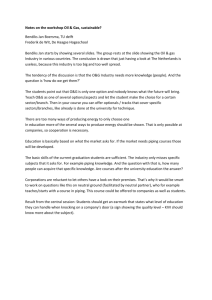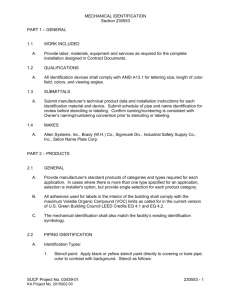DFTG 2323.doc
advertisement

Page 1 of 3 HOUSTON COMMUNITY COLLEGE – Northeast College Syllabus Pipe Drafting Drafting & Design Technology Mr. Minh Pham – Lead Instructor Course Reference Number: Instructor: Marvin Griffin Office Hours: 1 :00 p m Semester Credit Hours: to (SCH) Continuing Education Units: 4 :00 3 (CEU) pm DFTG 2323 Phone: 713 718-8410 Phone: (713)718-5255 Day(s): M-W Room: 156 Format: Lecture: 2 hrs. Lab: 4 hrs. 9.6 PREREQUISITE: DFTG 1305 COURSE DESCRIPTION: A study of pipe fittings, symbols, specifications and their applications to a piping process system. This application will be demonstrated through the creation of symbols and their usage in flow diagrams, plans, elevations, and isometrics. TEXT: Process Piping Drafting By: Parisher & Rhea Publisher: Gulf Publishing WORKBOOK: Process Pipe Drafting Workbook by Parisher& Rhea Publisher: Gulf Publishing LEARNING OUTCOMES: When students complete the course, the student will: • Create drawings of foundations, structural supports, and process equipment; • Identify symbols and research specifications; • Generate a bill of material list; • Use charts and standards; generate isometric drawings; • Calculate measurements for pipe fittings: • Utilize published ANSI, ASTM, ASME, and API charts pertaining to dimensions and other data commonly utilized in the preparation of process piping drawings and specifications. • Produce with reasonable accuracy and efficiency a set of working drawings for process piping. • Exhibit a general comprehension of the processing plant function and operation. • Exhibit skills of an entry level Pipe Drafter. COURSE WORK The course will consist of Study Guide and textbook reading assignments, lectures, class exercises, and drafting lab assignments. The student is expected to read and study the text Before the lecture on the unit. Study Guide units will be assigned either as homework or class work, at the instructor's option. (Refer to the "Course Outline & Assignment" document for scheduled weekly activities - Refer to the "Drafting Equipment & Supplies" list for drafting equipment requirements.) The student should bring the Study Guide, textbook, and drafting instruments every day, unless otherwise instructed. SCANS SKILLS: The Department of Labor has identified skill sets that U.S. employers want most in entry level employees. It is our commitment to prepare every student with the knowledge and skills needed to succeed in today’s dynamic environment. Toward this end the following skills will be included in this course: Decision making: specifies goals and constraints, generates alternatives, considers risks and chooses best alternative. Organize/maintain information: Organizes, processes, and maintains written or computerized records and other forms of information in a systematic fashion. Arithmetic: performs basic computations; uses basic numerical concepts such as whole numbers and percentages in practical solutions, makes reasonable estimates of arithmetic results without a calculator and uses tables, graphs, diagrams, and charts to obtain and convey quantitative information. The student will be presented problems in which they must establish their objective and organize and maintain appropriate documentation and dimensioned drawing details in achieving that objective. COURSE EVALUATION PROCEDURE: The student will be evaluated and receive a final grade based upon the following criteria: Laboratory work consisting of assigned technical drawing problems. A minimum of (2) tests: (a mid-term and a final examination): NOTE: - Individual instructors may schedule more test if desired Revised 6/30/2016 Page 2 of 3 Class and laboratory attendance, active participation in class, professional attitude and growth in terms of technical skill development and teamwork within the laboratory environment shall be taken into consideration. GRADING PROCEDURE: A = 90 –100 B = 80 – 89 C = 70 – 79 D = 60 – 69 F = below 59 The drawing portion of the above evaluation criteria shall be based to the following portions of the drawing development. Layout %; Dimensional accuracy %; Neatness %; Timely completion % LATE ASSIGNMENT POLICY: Students are encouraged to turn assignments in on time if at all possible. This allows the instructor to grade the work, return it to the student and the student use the feedback as a learning tool. MAKE-UP TEST/PROJECT POLICY: The student must request a make-up test and it should be scheduled at the earliest possible date following the quiz (or mid-term) missed. NO make-up test are given for the final examination. EXTRA CREDIT: Extra credit work is offered only to assist students that that have a grade range of “D” or “F” at the midterm break. This work cannot be substituted for regular assignments and can only raise the final grade to a maximum of a “C” PROGRAM ACCESSIBILITY (ADA): The Houston Community College, Drafting and Design Technology Program is committed to making all aspects of the program accessible to individuals with disabilities. Students with disabilities, as defined by the American with Disabilities Act (ADA), are required to obtain certification of their impairment through the Northeast College ADA Certification Office, located in the Northline Mall Campus. For information call Barbara Morris at, 713-718-8148. CLASS ATTENDANCE: You are expected to attend all lecture classes and labs. You are also responsible for materials covered during your absence from either. You must contact the instructor to obtain make-up assignments. Class attendance is checked daily. It is your responsibility to drop a course, should you choose. The instructor does not have the authority to drop you from the class per Student Handbook link below. Failure to withdraw officially will result in you receiving a grade of “F” in the course. Note: Although it is your responsibility to officially withdraw from a course, it is always a good idea to discuss any attendance problems with your instructor first. Class attendance is very important, but your instructor may be able to help you catch up. If you become ill or know you are going to miss class for some reason, tell your instructor as soon as possible. Departments and programs governed by accreditation or certification standards may have different attendance policies. RELIGIOUS HOLIDAYS: If you observe a religious holiday and miss class, you must notify your instructor in writing two weeks in advance to arrange to take a test or make up an assignment. A religious holiday is "a holy day observed by a religion whose place of worship is exempt from property taxation under Section 11.20, Tax Code." SCHOLASTIC DISHONESTY: Students are responsible for conducting themselves with honor and integrity in fulfilling course require-ments. College System Officials may initiate penalties and/or disciplinary proceedings against a student accused of scholastic dishonesty. "Scholastic dishonesty" includes, but is not limited to, cheating on a test, plagiarism, and collusion. "Cheating" on a test includes: Copying from another student's test paper; Using materials during a test that are not authorized by the person giving the test; Collaborating with another student during a test without authority; Knowingly using, buying, selling, stealing, transporting, or soliciting in whole or part the contents of an unadministered test; Bribing another person to obtain a test that is to be administered. "Plagiarism" means the misuse of another's work and the deliberate incorporation of that work into work you offer for credit. "Collusion" means the unauthorized collaboration with another person in preparing work offered for credit. Determination of scholastic dishonesty will be at the discretion of the instructor. Reference the following web link for additional information: http://www.hccs.cc.tx.us/handbook/StudentP.htm *The Final Examination Date & Time: Month 00, 2000 from ##:00 a m to ##:00 am “Notice: Students who repeat a course three or more times may soon face significant tuition/fee increases at HCC and other Texas public colleges and universities. If you are considering course withdrawal because you are not earning passing grades, confer with your instructor/counselor as early as possible about your study habits, reading and writing homework, test-taking skills, attendance, course participation, and opportunities for tutoring or other assistance that might be available.” Revised 6/30/2016 Page 3 of 3 Course Schedule Pipe Drafting DFTG 2323 Week 1 Introduction to Piping Drafting I Drafting techniques: Line work, Lettering Equipment & Terms Week 2 Basic Piping Data, Fittings, Flanges and Valve Week 3 Flow Diagram and Instrumentation Process Mechanical and Utilities Introduction to Instrumentation Symbols and Abbreviations Assignment N0.1 Week 4 Abbreviations and Specifications Piping Drafter abbreviations, Piping Specifications, Insulation Basis for Instrumentation locations Pipe line and pipe specialty lists Quiz N0. 1 Week 5 Nomenclature: Vessels, Structural, concrete, electrical Assignment N0. 2 Week 6 Equipment location Pump location in equipment arrangement Horizontal vessels related to pumps Vertical vessels location from racks Quiz N0.2 Week 7 Plot plan Equipment arrangement Pipe racks Piping drawing index. Control buildings Heaters and coolers locations Assignment N0. 3 Week 8 Piping standard details Base support, dummy supports Vent and drains. Level Instruments Bridle hookup. Traced lines Week 9 Piping design notes & Plans Drawing instructions Typical Pump piping layouts Control stations, meter run. Vertical vessel piping, Pipe spacing Flange bolting, Studs Week 10 Manufacturer’s Equipment Drawings Applied information. Nozzle Orientation, Elevation & Projection Quiz N0. 3 Week 11 Piping Plan, Elevation and Sections Required Information for drawings construction Process Equipments. Piping Isometrics Week 12 Introduction to Pipe supports Introduction to Pipe Hangers Foundations Assignment N0. 4 Week 13 Math review: Trigonometric problems, Metric System, Fractions Week 14 Isometrics: Definitions, Dimensioning, Call-outs Quiz N0. 4 Week 15 Material Take-Off Review for Final Exam Week 16 Final Exam Mid-Term Exam Revised 6/30/2016

